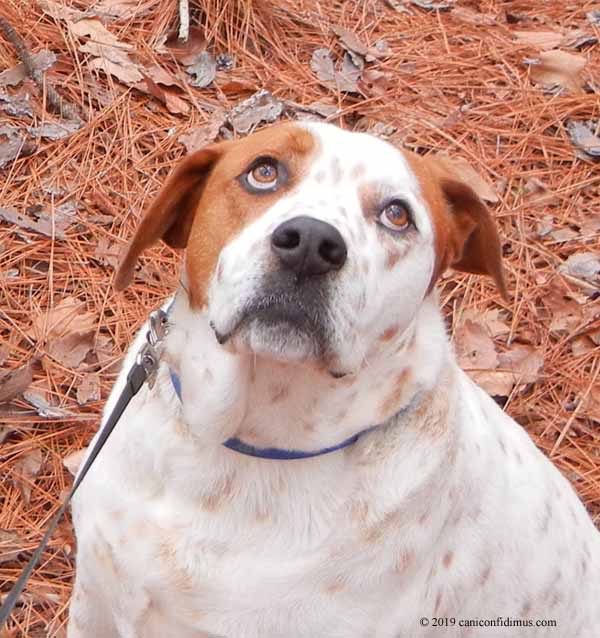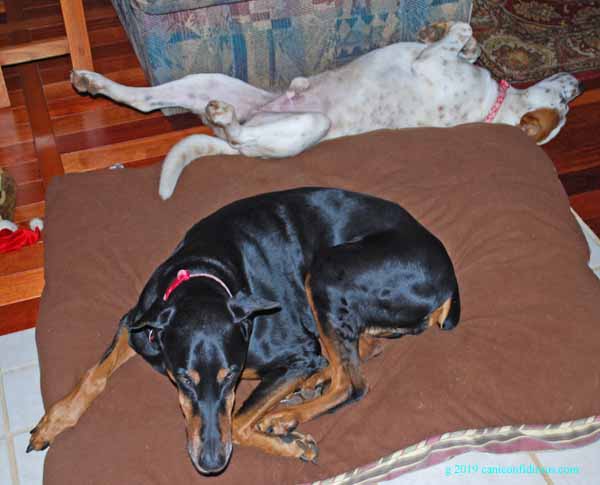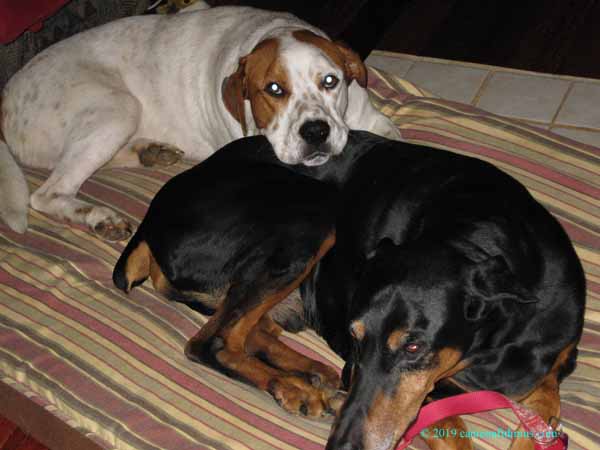
The first time Zeus, my last doberman, and I saw Zeke, he was lying in our across-the-street neighbor’s front yard. Our neighbor had brought him home for the kids, but the dog stayed outside and I never saw anyone interact with him. I guess they fed him, since he didn’t seem to be losing weight. On weekends when I took Zeus for a walk, Zeke always watched us hopefully. I was a little uncertain about this dog with what seemed like such a big head, so I usually ignored him, and Zeus and I went on our way. One day I gave in and said, “OK, come on.” It was all he needed.
After that, Zeke went with us on our walks. He eventually gravitated towards our house. The neighbors apparently thought we stole their dog, but Zeke made his own decision. But we already had a dog. I had adopted Zeus from a doberman rescue group in 2003 after my previous doberman died. We all got along well, and everyone was happy with the way things were.
So we did what we always do with the abandoned dogs up here, we took Zeke to the vet for vaccinations and then advertised for someone to adopt him.
Someone did adopt him. As they left, I warned them not to let Zeke out of their van off leash because he would run away. Even that long ago he always took off if given an opportunity. So they assured us they would keep him on leash, and they drove off.
Shortly after Zeke’s adoption Leah and I drove out to Yellowstone for a two-week vacation. When we got home, we had a message from our vet. Someone had found “our” dog, checked the rabies tag and called the vet. “Our” dog was being boarded on the other side of town. We decided it was fate telling us that Zeke really was our dog, so we brought him home. That was in the fall of 2006.
Zeus was familiar with Zeke by that time, and Zeus was a good-natured dog, so they got along well. Zeke naturally assumed the position of second dog. Zeus had a bed beside our living room sofa, and Zeke had one against a wall. When we went to bed, Zeus came into our room to a bed beside our bed. Then Zeke got up and went to Zeus’s bed beside the sofa.
Sometimes they shared the bed.

Zeke loved Zeus.

Back in those days I sometimes took both dogs on walks into the woods off leash. Zeus stayed pretty close, but Zeke immediately disappeared into the woods. Sometimes he came back out with us, and sometimes he didn’t. Sometimes Zeus and I would get a couple of hundred yards up the road before Zeke followed us up. Zeus seemed worried about that, because he kept looking back over his shoulder for Zeke.
I sometimes took both dogs outside if I happened to have work to do in the yard. Zeus would stay near, but not Zeke. Unfortunately, Zeus followed Zeke if he decided to go exploring. Once he led Zeus about two miles down the mountain, where one of our neighbors recognized them and called us. They were covered in mud.
The two dogs were pretty much inseparable for the next three years, except for when I had to drive somewhere in my truck. I could put Zeus in the back seat of the truck and leave the windows down if the weather was warm, and he would never try to get out of the truck. But Zeke would always try to get out of the truck if the windows were low enough. That meant Zeke couldn’t go if the weather was warm and I had to get out of the truck without the dogs.
So it was that I drove over to my mother’s house one Sunday with Zeus but not Zeke. When we got out of the truck, Zeus began to stagger. He had never done that before, so I had no idea what was happening. I called our vet to have someone come in to the office, then I rushed over. The vet hooked up an ECG machine to check his heart. The trace looked like a bug had crawled through ink and then across the ECG printout. Zeus was suffering from cardiomyopathy, a heart condition that is not uncommon in doberman pinschers.
The vet prescribed some medication, but there is really no effective treatment for the condition. Zeus seemed OK for a while. Then one day in late December he was lying in his bed beside the sofa as we watched television. I would usually have one hand on him as we sat there, but not this time. I got up for something and looked at Zeus. He was twisted backwards as if he were trying to look over his back, and he was not moving. He had died right there beside us. That was December 29, 2009.
So Zeke became our only dog. Who knows whether dogs understand what death means. He seemed OK, but we knew he missed Zeus.
In any event, we continued to live our lives and so did Zeke. He was one of the good ones. Other than running away if a door was left open, he was an almost ideal dog. He knew what we wanted him to do, and he did it. If we took him to the vet, he almost automatically walked over to the scales and climbed up to be weighed. He remained calm while the vet poked him, and he stood stoically when he got his temperature taken or had vaccinations.
When my mother died in 2013 and we inherited her little dog Lucy, Zeke was perfectly OK with it. They didn’t have much to do with each other, not a surprise given the size difference. But Zeke never tried to eat her dinner or take her treats. He respected her.
Zeke got out of the house pretty often. At least it seemed that way. He would roam all over the top of the mountain and sometimes far down towards the bottom. One time someone who lived in Texas Valley found him running loose in the rain and brought him back to our house in her backseat. He was soaked, and so was her back seat. Another time a county police officer brought him back.
That was essentially Zeke’s only fault.
I knew that after 13 years Zeke’s days were numbered. He had been turning gray and slowing down. But when I took him in for his annual shots last week, I told them to give him a three-year rabies vaccination. On Monday, he started acting like he was in pain. We assumed it was his arthritic back, which occasionally causes him some pain. I gave him one of his pain pills and we waited. It has always taken a couple of days for him to get any relief, so we weren’t surprised that he was restless Monday night. Then on Tuesday, he threw up everything he ate. On Wednesday he didn’t. But Wednesday night he became restless again. I noticed that his breathing was shallow and quick. I considered taking him to the emergency vet clinic that recently opened in Rome, but I decided to wait till Thursday to take him back to our vet.
She palpated him abdomen, and he yelped. She decided he had some kind of stomach upset, so she prescribed an anti-nausea pill and some antibiotics.
Late Thursday night, Zeke was in distress. He was obviously in pain, and although he politely ate his dinner around 4 in the afternoon, he refused anything later, no matter how tempting it would normally be. I wanted to give him another pain pill, but I couldn’t get him to eat a marshmallow with a pill hidden inside. Or even a little bit of ice cream.
By 11 pm he was so bad I decided to take him to the emergency vet clinic. I had to carry him to the truck. Along the way his rear end fell off the back seat and got wedged between the back seat and the back of the front seat. That would never have happened to him before.
At the clinic they did blood work. His liver and kidneys were not functioning, and his white blood cells, red blood cells and platelets were all off. His abdomen was very painful to the touch. Then they did an ultrasound. That’s when they found the big mass on his spleen.
He was in such pain and discomfort that I decided to leave him at the vet’s so they could give him some strong pain medication. There was no way he could possibly have gone home and not been in unacceptable pain. I got in bed around 2 am, with the intention of getting up around 6:45 to pick him up and take him to our regular vet.
The clinic called around 6 am to tell me he was still having pain despite the strong medications they were giving him.
I picked him up around 7:30. The vet at the clinic had been talking about going to Atlanta or Chattanooga to a specialist for a more extensive ultrasound, or possibly a biopsy. Since it was Friday I figured there was no way I could get him to a specialist until after the weekend. Zeke needed some kind of immediate attention, so I took him to a different vet we had used before, one that I thought probably had an ultrasound at the clinic. The emergency clinic sent all Zeke’s test results so they could look at it before I got there.
I took him into the clinic and waited in an exam room for a while. Zeke was still in obvious pain. As we waited for the vet, he was shivering and every breath turned into a moan.
When the vet came in, she had looked at the test results and said there was so much going on with Zeke that trying to resolve anything at that point would be useless. His organs were just giving up. She said the only realistic course of action was euthanasia. It was not a surprise to me. I had already told Leah that I did not expect Zeke to come back home.
I took Zeke home and buried him in the yard next to Lucy’s grave. Back in 2009 I had Zeus cremated. I put his ashes in the grave with Zeke, along with Zeke’s collar and his peanut butter bong.
Zeke seemed to crash suddenly. One day he was feeling OK, and four days later he was in such bad condition that it was intolerable. As we look back, though, we think we see signs of problems going back weeks if not months. For one thing, he had been drinking abnormally large amounts of water for a long time. The trouble he had making the climb back to the house on our regular walk down the mountain, which I had attributed to age, might have been the result of his cancer. Dogs, like most animals, hide their pain and worsening health as long as they can. I hate to think he might have been having pain for weeks before we realized it. I also have to wonder whether something might have been done if we had know about the tumor earlier.
Zeke is the fifth dog I have had euthanized, and it doesn’t get any easier with practice. In every case I have known that the only alternative was pain, and a painful death in a short time. But I still feel guilty about doing it. I feel like it’s a betrayal of my dog’s trust. I’m supposed to help them, and they trust me to do that. In the end, I can’t help.
We let Sam see Zeke’s body before I buried him. We don’t know whether he realized what he was seeing, but we think Sam is going to miss Zeke terribly.
I wrote this Friday night, after picking Zeke up, taking him the vet, deciding to have him put down, digging a hole in the ground, putting Zeke in it and filling it back up.
We did our usual Friday night stuff. We went out for chicken, and I thought now we only need to bring home two french fries, not four as usual. We had just gotten used to not having to bring home a tiny extra piece for Lucy.
We watched Secret Life of Pets 2, and went to bed. I thought I would sleep soundly Friday since I had only about four hours of sleep Thursday night. But I didn’t.
This morning Zeke was still gone.
This was too sudden. We really didn’t have any warning that it was coming.
How can a dog fill a house? Even a dog of Zeke’s size? As I went about my morning routine this morning, every time I turned around there was a hole that Zeke used to fill. When Zeke slept by the bed, I had to pet him a little every time I passed by, getting into bed, getting out of bed to go to the bathroom, going back to bed, getting up in the morning. He needed a scratch on his back, or on his belly or on the top of his head.
I put on my socks this morning, and I didn’t have to give Zeke a little pat on the head between socks. He didn’t stick his head between my legs as I tried to put on my shorts. I took Sam out, and I didn’t have to wait while Zeke stared off down the driveway, thinking whatever doggy thoughts he did in the mornings.
I ran our battery vacuum around the house to pick up the dog hair, and I didn’t have to let Zeke skirt around me to get away from the sound. I wondered whether the vacuum would have half as much hair from now on, because there wouldn’t be that snow-shower of dog hair every time he shook. We won’t need that hand towel by the water bowl that we used to wipe his mouth after drinking — sometimes he forgot to swallow that last mouthful of water.
He won’t be watching hopefully when I pick up the keys to my truck. He always wanted to go for a ride.
He was only a dog, but he left a hole in our lives that was bigger than a dog.